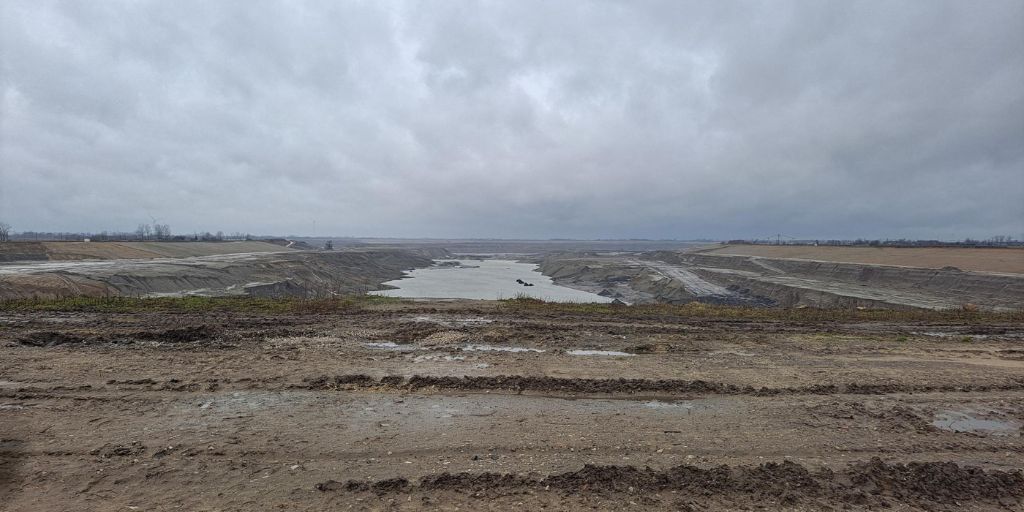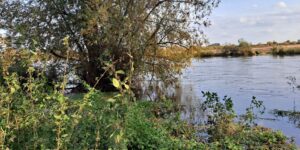Eastern Wielkopolska, one of Poland’s just transition regions, urgently needs to repair the damage caused by decades of lignite mining. One controversial hydrological project slated for the region aims to flood open pits and stabilise water levels. But while these measures appear to be positive steps towards making amends, the environmental impacts of the project have not been assessed, which is likely to result in a number of unintended and damaging consequences.
Rafał Rykowski, Biodiversity Campaigner, Polish Green Network and CEE Bankwatch Network, and Miłosława Stępień, Just Transition Coordinator, CEE Bankwatch Network | 7 May 2024

Eastern Wielkopolska, one of Poland’s just transition regions, urgently needs to repair the damage caused by decades of lignite mining. One controversial hydrological project slated for the region aims to flood open pits and stabilise water levels. But while these measures appear to be positive steps towards making amends, the environmental impacts of the project have not been assessed, which is likely to result in a number of unintended and damaging consequences.
There is a current acceptance that Poland is riding on the tail end of Europe’s just transition. However, Eastern Wielkopolska would beg to differ. What makes this region unique is that it has officially pledged to phase out coal by 2030 and to achieve climate neutrality by 2040. Both of these ambitious targets precede those of the entire EU region by a full 10 years.
In April 2022, Polish energy and mining company ZE PAK and state hydrological authority Wody Polskie announced a project aimed at increasing water retention and restoring water resources in post-mining areas in Eastern Wielkopolska. The project is co-funded by the Just Transition Fund under the 2021–2027 European Funds for Wielkopolska programme.
On the face of it, the project seems environmentally progressive. To address the damage caused by years of lignite mining, the project aims to flood open pits and improve the water regime in the region. Carrying out a hydrological project of this kind is undoubtedly essential for the area. It should also be implemented while respecting the principle of ‘do no significant harm’ and prioritising restoration measures for the Warta River Valley.
But the devil is in the details. Key environmental standards have been overlooked during the preparation of the project’s environmental implementation plan, which also omits a number of other significant details. This lack of oversight has been heavily criticised by local environmental organisations, culminating in a heated discussion at a recent meeting of the subcommittee for Eastern Wielkopolska, which advises institutions and monitors the spending of EU funds, some of which are earmarked for water improvement measures.
Organisations closely monitoring the project argue that no objections to the hydrological project would have been raised had it been primarily designed as a restoration programme. But ZE PAK and Wody Polskie take a different view. ZE PAK, a company that extracts and produces energy from lignite, is currently phasing out its open pits. Wody Polskie is a state-owned institution responsible for water management.
According to the president of ZE PAK S.A. Piotr Woźny, local environmental activists are delaying the decision-making process and blocking the distribution of PLN 120 million (EUR 27 million) from the Just Transition Fund by criticising the project and demanding changes.
Yet, nothing could be further from the truth. Local activists do not intend to block the project, but rather to improve upon the more positive aspects of the plan. Unfortunately, the environmental impacts of the planned investments have not been subject to a rigorous enough assessment. There are also concerns about its potential negative impact on Natura 2000 sites and other nature conservation areas. But the biggest issue is the likely negative impact on the water balance of the Warta river.

A water crisis in the making
Although the project contains many elements that will improve the water situation in the region, it threatens the ecosystems associated with the Warta River Valley and its tributaries, as well as the inhabitants of these areas. Water intakes for many towns and cities, including Poznan, are linked to the Warta riverbed.
‘We’re most concerned about the idea of drawing water from the Warta for the purpose of flooding the closed opencast lignite mines. According to the plan prepared by Wody Polskie, water would be taken even when very little remains in the river – and at flows lower than the multi-year average, which are recorded over two-thirds of a year for the Konin area. Exacerbating the Warta’s water deficit threatens protected species and habitats. And it may also result in water shortages from waterworks using the river intakes,’ warns nature conservationist Jacek Engel of Greenmind Foundation.
ZE PAK itself has acknowledged that the process of raising groundwater levels (as well as the water table in the open pits) is proceeding faster than planned and could have been implemented without taking water from the Warta on such a massive scale.
Short-term thinking leads to long-term delays
The Frank Bold Foundation has called for the project should be subject to a comprehensive strategic environmental impact assessment. This procedure would allow for the cumulative impacts of the project on the environment in the Wielkopolska region to be assessed and understood.
Even though ZE PAK and Wody Polskie have not carried out a strategic assessment procedure, they have already started work on obtaining environmental permits for the 25 individual projects that make up the venture. But because they’re assessing investments on an individual basis, the cumulative impact of the proposed actions on the environment are difficult to determine.
‘If the project developers had carried out a strategic assessment at an early stage, the project would now be at a much more advanced phase. These shortcuts mean we’ll have to wait longer to improve water conditions in the region. This case should serve as a warning for similar projects being planned in other regions. Investments of this size, on top of being publicly funded, must meet the highest environmental standards. Otherwise, they will be pro-environmental in name only,’ says Adrian Chochoł, a lawyer from the Frank Bold Foundation.
Pouring EU money down the drain
Another problem, perhaps the most serious in terms of finance and the economy, may arise from this investment fever.
‘We appreciate that ZE PAK and Wody Polskie are committed to this just transition project for Eastern Wielkopolska – a transformation that takes into account social and environmental contexts. But a hydrological project designed in this way is likely to violate Polish and EU law. This will only worsen the state of the region’s waters and the quality of life of its inhabitants. Plus, we’ll never get back the money invested,’ says Krzysztof Pietruszewski, a Polish Green Network activist from the Wielkopolska region.
Members of the subcommittee for Eastern Wielkopolska warn that a project that raises so many legal and environmental issues is unlikely to be approved by the European Commission for reimbursement from the Just Transition Fund. The loss of PLN 120 million (EUR 27 million) would certainly benefit neither the region nor anyone involved in the project. Given its positive objectives, this project should not be stopped. However, it needs to be thoroughly reassessed to bring it in line with EU standards and legislation.
Above all, the promoters should design and implement a reliable and strategic environmental impact assessment of the activities planned within the scope of the project, and fully consider criteria applying to the ‘do no significant harm’ principle. Finally, all works that compromise the ability of the project to meet environmental objectives in relation to water bodies and protected areas under the EU Water Framework Directive should either be redesigned with expert input or abandoned.
Never miss an update
We expose the risks of international public finance and bring critical updates from the ground – straight to your inbox.
Theme: biodiversity, just transition, Eastern Wielkopolska, hydrological project
Location: Poland
Project: EU funds and biodiversity | Just transition
Tags: biodiversity | just transition
